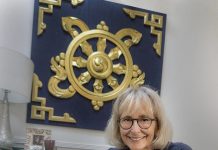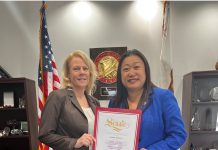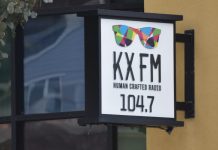
As it turns out, Nick Hernandez, Jr., can really sing the blues.
It’s just that ability to defy stereotypes that makes Hernandez stand out in a crowd. His soul-rippin’, bluesy reggae style is a favorite of Laguna Beach ocean artist and environmental activist Wyland, who recently offered Hernandez the lead vocalist position on the soundtrack for his new documentary, “Blues Planet.”
“I always had Nick in mind,” said Wyland while painting in his Laguna studio and listening to Gregg Allman’s new release, “Low Country Blues.” “I asked him point-blank a couple of years ago if he did blues. He’s been doing some garage-style renditions of some of the music I wrote. He’s an absolute ripper on the blues.”
Regardless of the reactions, Hernandez now goes by Nick I, his Rasta-inspired name for one with God. “I got heckled all day long,” said Hernandez, “never by Jamaicans, never by Rastafarians, just by the fakes. L.A. bands with dreadlocks were always giving me grief because I wasn’t black.”
That rebel style is all part of the attraction. “I love his voice and I like his personality,” Wyland said. So much so that Wyland agreed to let Hernandez collaborate as songwriter on the soundtrack and booked him with a band of top musicians, including Taj Mahal, Rod Piazza and the Mighty Flyers, and harmonica-legend Kim Wilson for five days of studio time in New Orleans in May.
Five days after the Deepwater Horizon rig exploded and oil and gas began spewing into the Gulf of Mexico last year, Wyland traversed the area on a boat with the National Wildlife Federation.
“My eyes were burning and I couldn’t breathe and, of course, 11 people died on that day,” recalled the ocean artist, who, motivated by marine ecologist Jacques Cousteau, became an eco-aware painter long before anyone took it seriously. “The planet’s got the blues,” he said.
On that day, an idea began to bubble, a documentary about the earth’s current questionable condition that Wyland would later christen “Blues Planet.” The experience immediately moved the filmmaker, who has produced several cause-driven documentaries, to write the first song of the soundtrack, “Dirty Oil.”
True to his reggae-roots tradition, Hernandez is also outspoken on environmental and social issues. “This man has really changed my flight big,” Hernandez said about Wyland’s homage to the sea. “I’m really enjoying writing blues songs more than anything ever. Wyland told me, ‘You’ve found your soul again.’”
For Nick I, the blues are second-nature. His dad, Nick Sr., a local plumber, emerging sculptor and outspoken activist himself, is an avid old-time blues fan. He sang in a jazz band on Sundays in a South Laguna restaurant and took little Nick with him.
“I was singing Oscar Brown, Jr.’s ‘Brother Where Are You?’ when I was 5,” said Nick Jr., now 46. At 9, he “fell in love” with the off-beat on his dad’s Bob Marley and the Wailers album. “People have always said, ‘You kinda sing bluesy for a reggae guy.’”
Reggae and rhythm and blues entwine historically as well as attitudinally, which suits Hernandez Jr.’s disposition just fine. As a student at the UC Santa Barbara, he was the first nonblack to audition for the gospel choir. His singing was confined to the back row for a year. Then the choir director overheard him in a practice room, finishing a song in classic blues phrasing, stretching out one syllable into a flourish of octave-bouncing notes.
“‘You, come here,’” Nick Sr. recalled his son’s incident with the six-foot-nine choir coach, music promoter and contemporary gospel singer Michael McCurtis. “‘Where in the @#&* did you learn to sing black?’” Blues-lovin’ dad got the blame and Nick Jr. took a spot front-and-center.
When McDonald’s collegiate Gospel Festival performed at the Los Angeles Shrine Auditorium, Hernandez again stood out from the din, singing a prison-inspired reggae riff specially written by Reggae Lee that earned a standing ovation after the first few bars. When the last note was hit, the audience was still on their feet.
Hernandez went on to bigger things, but, after a clash of personalities at Virgin Records, he put the brakes on pursuing musical stardom, even after selling songs to Ford for a Lincoln-Mercury commercial, the Farrelly Brothers for their “Kingpin” soundtrack and Rock & Roll Hall of Fame musician Dave Mason.
Hernandez, a skimboarder and surfer who grew up in Laguna, opted for a simpler life. He started working on a Dana Point lobster boat while composing songs for his band, Common Sense. He also teaches autistic children how to surf through the Paskowitz Surf Camp’s Surfers Healing program, which took him to Puerto Rico this week.
But the low-profile life may soon slip from view as a broader horizon calls. Before recording begins, Wyland is taking Hernandez to New Orleans, the birthplace of the blues, for its annual Jazz Fest, and to witness the oil spill’s aftermath. “I want to paint a picture in people’s minds that we need to get away from dirty oil and dirty energy and start using renewable, clean energy,” said Wyland. “It’s really a cause album. It’s the right music at the right time. And Nick I is the right singer.”





Just WOW…amazing